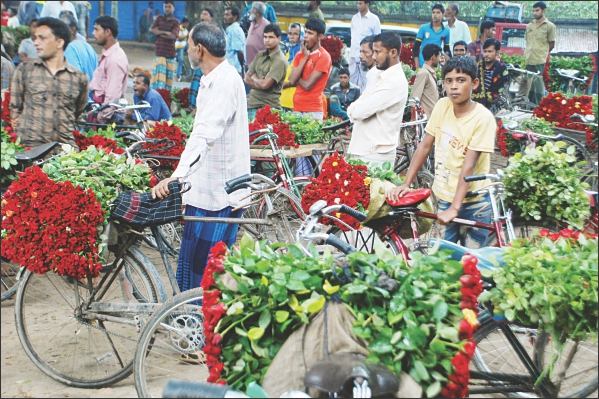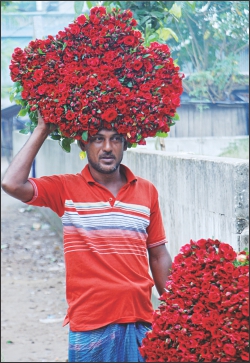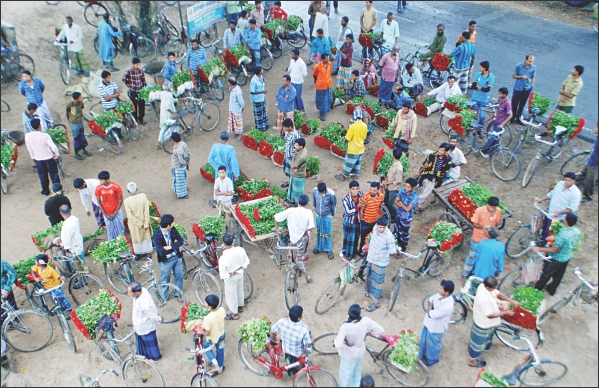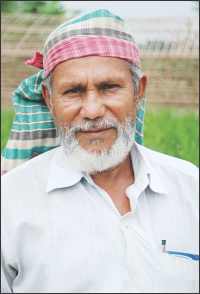Farmers’s Voice
Saga of a Flower Devotee
New Year brings hope to life as the blooming flowers. New Year comes like a blessing for many and we see the ups and downs on the road of our life. Today, I'll tell you the story of a colourful land that is bringing new hopes and aspirations all across the country.
.................................................................................................
Shykh Seraj

 Cultivation of the European cut-flower Gerbera in Bangladesh. Surprised? Don't be. A huge change has shaped like a revolution in Jhikorgachha upazila of Jessore. This area is spreading fragrance and colour to the whole nation. Flower fields have become an industry now-a-days. The region is a symbol of booming success. Farmers are cultivating Gerbera with their own experience under the greenhouses that also provoked surprise among many. Cultivation of the European cut-flower Gerbera in Bangladesh. Surprised? Don't be. A huge change has shaped like a revolution in Jhikorgachha upazila of Jessore. This area is spreading fragrance and colour to the whole nation. Flower fields have become an industry now-a-days. The region is a symbol of booming success. Farmers are cultivating Gerbera with their own experience under the greenhouses that also provoked surprise among many.
There have already been 10-15 greenhouse shades. Even a year ago, Gerbera flower was being imported. Now, farmers are meeting the demand of this flower by producing it locally. That's a great news for all of us and for Bangladesh!
In about the mid 80's. John Paul Paren, a Belgian who came to Bangladesh as an officer for a donor agency, tried to cultivate European flowers here. He was the first person to produce Gerbera in Bangladesh. I was so amazed with the beauty of this flower and was wondering when it will be produced in Bangladesh. You would also be amazed if you can see with your own eyes the huge colourful greenhouses here. I can proudly say that our farmers are producing these flowers with their own management, effort and creativity.
The hero behind this massive revolution is Sher Ali Sardar who started flower gardening in the 80's on only 30 decimals of land. At present, the flower farming area in this region has expanded on 10000 hectares of lands. Sher Ali, the valiant farmer, spread the most colourful and profitable Gerbera flower in many farmlands of this region.
I had the privilege to talk to Sher Ali about the many prospects of flower farming in Bangladesh and how it all began in Bangladesh.

 “I've seen greenhouses in Holland when I was there in 1995. Only difference between my greenhouses with them is the lack of electricity. You can call it natural greenhouse”, said Sher Ali. “I've seen greenhouses in Holland when I was there in 1995. Only difference between my greenhouses with them is the lack of electricity. You can call it natural greenhouse”, said Sher Ali.
“Do you think you achieved what you aimed”, I asked.
“Yes, of course. Many people are following my example and already 20-30 bighas of land have turned into greenhouses”, replied firm Sher Ali.
“My irrigation process is a little different”, he added.
“How is that”, I wondered.
“I'm conserving the natural rainwater. And I'm saving underground water in a drain also. These two sources of water are arsenic and iron free, which I'm using for my trees”, said Sher Ali.
“Are you doing rainwater harvesting too”, I asked curiously.
“Yes, even a single drop of rainwater will be used for cultivation. I also do fish-farming in this drain”, replied Sher.
“Nilotica, Monosex Telapia, Ruhi, Katla, Mrigel fish”.
I was spellbound to learn that how a Bangladeshi farmer's hand can create magic in many ways that we hardly can imagine. Sher has already established 11 farms and it took him four years to build those. And he's also planning to extend.
I met some other farmers there who enlightened me about some more prospects and about their indigenous talents.
Previously, flower plants were being imported from India. But, not anymore. Now farmers are making it with their own method “tree from tree”. There was a question regarding the quality. Farmers said they germinate the plants so that they don't get rotted. Then they plant those in a flower bed for fifteen days and then they replant those on their farmland.
Sher believes Bangladesh has a far better fertile soil which can develop anyone if he wills to bring sustainability in his life. Only thing that is needed is perseverance.
At least 20 farmers have started commercial Gerbera farming, influenced by Sher Ali. They've invested about 2.5 lakh to 35 lakh taka in each shade. I talked with another flower farmer who is also doing great like others.
“How much land do you have in this garden?”
“33 decimal”
“How much did you spend?”
“10 lakh 20 thousand taka and already sold around 7 lakh taka”
“Any plans for extension?”
“Yes. I'm building a new shade”
Success came here in a different way. Flower cultivation has revealed many ways to be a person of wealth, honour and prosperity. Faruq Hossain Laltu, son of Sher Ali Sardar went to South Korea in hope of a better life. Later, he came back and involved himself in flower cultivation and now only follows the track of success that his father built for many in this region. And, he's happy and developing every day.
Godkhali Flower Farmers and Traders' Association has been working relentlessly to expand the Gerbera farming in this region. I talked to Abdur Rahim, Chairman of the association. He also believes that infrastructure has to be more advanced where farmer can easily access and make the best business with all the facilities that we see in modern flower markets. That also reminds me of Kunming in China, though it was an auction market but the facilities farmers enjoy there, really speed up their work effectively and efficiently.
Dear readers, the flower discovered in eighteenth century by the German Flower and Nature Specialist Traugott Gerber is now the most colourful and artistic Gerbera of the modern days that has reached Bangladeshi soil. Still, I would say a proper market system is needed and apart from farmers' indigenous intervention, a proper scientific framework for developing the flower cultivation is very much needed here that will only build a sustainable economy here in Godkhali.
More than 30 species of Gerbera are now available in Bangladesh. Not only he has improved his own state but also improved the state of other farmers. I salute Sher Ali Sardar for creating a place for Gerbera flowers in our land- A real farmer who truly showed the real meaning of prosperity, and showed others the way towards success.
Photographs by Srabon Reza

Copyright
(R) thedailystar.net 2013 |


 C
C
 “I've seen greenhouses in Holland when I was there in 1995. Only difference between my greenhouses with them is the lack of electricity. You can call it natural greenhouse”, said Sher Ali.
“I've seen greenhouses in Holland when I was there in 1995. Only difference between my greenhouses with them is the lack of electricity. You can call it natural greenhouse”, said Sher Ali.